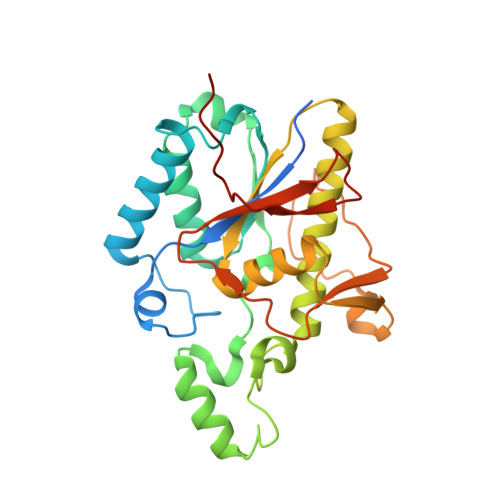Structure and activity of the metal-independent fructose-1,6-bisphosphatase YK23 from Saccharomyces cerevisiae.
Kuznetsova, E., Xu, L., Singer, A., Brown, G., Dong, A., Flick, R., Cui, H., Cuff, M., Joachimiak, A., Savchenko, A., Yakunin, A.F.(2010) J Biol Chem 285: 21049-21059
- PubMed: 20427268
- DOI: https://doi.org/10.1074/jbc.M110.118315
- Primary Citation of Related Structures:
3F3K, 3LG2, 3LL4 - PubMed Abstract:
Fructose-1,6-bisphosphatase (FBPase), a key enzyme of gluconeogenesis and photosynthetic CO(2) fixation, catalyzes the hydrolysis of fructose 1,6-bisphosphate (FBP) to produce fructose 6-phosphate, an important precursor in various biosynthetic pathways. All known FBPases are metal-dependent enzymes, which are classified into five different classes based on their amino acid sequences. Eukaryotes are known to contain only the type-I FBPases, whereas all five types exist in various combinations in prokaryotes. Here we demonstrate that the uncharacterized protein YK23 from Saccharomyces cerevisiae efficiently hydrolyzes FBP in a metal-independent reaction. YK23 is a member of the histidine phosphatase (phosphoglyceromutase) superfamily with homologues found in all organisms. The crystal structure of the YK23 apo-form was solved at 1.75-A resolution and revealed the core domain with the alpha/beta/alpha-fold covered by two small cap domains. Two liganded structures of this protein show the presence of two phosphate molecules (an inhibitor) or FBP (a substrate) bound to the active site. FBP is bound in its linear, open conformation with the cleavable C1-phosphate positioned deep in the active site. Alanine replacement mutagenesis of YK23 identified six conserved residues absolutely required for activity and suggested that His(13) and Glu(99) are the primary catalytic residues. Thus, YK23 represents the first family of metal-independent FBPases and a second FBPase family in eukaryotes.
Organizational Affiliation:
Banting and Best Department of Medical Research, Centre for Structural Proteomics in Toronto, University of Toronto, Toronto, Ontario M5G 1L6, Canada.















